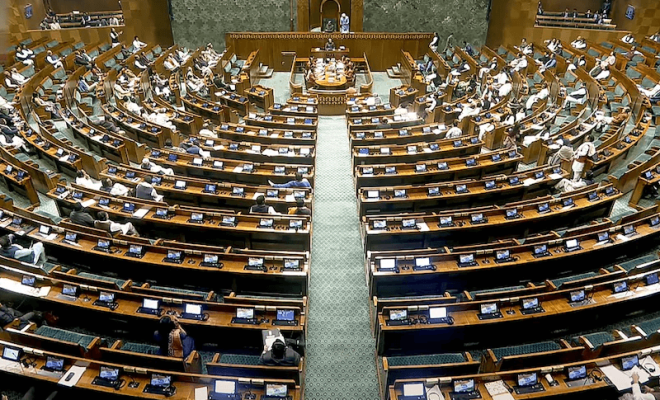‘One Nation, One Election’ Proposal Failed to Gain Two-Thirds Support in Lok Sabha

As part of the governing BJP’s ‘one nation, one election’ initiative, the Lok Sabha took a division vote on Tuesday to present two measures to change the Constitution and allow for simultaneous federal and state elections. As required by the regulations, the bills were officially introduced in Parliament by simple majority, 269 MPs voted in favour of them while 198 opposed them. Critics of the ‘one nation, one election’ law, however pointed to the margin arguing that it revealed the government’s lack of support for the proposals even at this point.
Two-thirds majority (307) was needed out of the total 461 votes, but the government secured only 263, while the opposition got 198. The ‘One Nation, One Election’ proposal failed to gain two-thirds support. pic.twitter.com/5GIQQ0qY7r
— Manickam Tagore .B🇮🇳மாணிக்கம் தாகூர்.ப (@manickamtagore) December 17, 2024
The regulations state that in order for these constitutional reforms to pass the Lok Sabha two-thirds of the MPs who are present and voting must approve them. Using today as an example, the Congress said that 461 members participated in the voting to present the bill for a constitutional amendment. Only 269 of those 461 voted in favor of the measure which would have required 307 of them to do so. As a result, the Congress said, “This bill does not have support… many parties have spoken against it.” There is some truth in the Congress’s exultations.
As of right now the opposition party, the Congress-led INDIA has 234 MPs while the BJP-led National Democratic Alliance has 29Therefore, if an equal number of MPs are present and vote in favor of passing the proposals to modify the Constitution, the BJP will require assistance from non-aligned parties. The YSR Congress, which has four MPs, and the Akali Dal, which has one, are the only options in that scenario. Both have promised to help.
It means that in order to pass the Lok Sabha with his “one nation, one election” vision, Prime Minister Narendra Modi needs at least nine more votes which is not impossible to acquire for the BJP. A full strength Lok Sabha would require an additional 64 votes for the BJP. As the Congress leaders stated, the NDA’s score is insufficient even at full strength to pass legislation amending the Constitution.
Opposition Slams on the Bill:
Law Minister Arjun Ram Meghwal presented the Constitution (129th Amendment) Bill to the Lok Sabha this afternoon. The opposition launched vicious attacks after the implementation.
Heading the opposition were Manish Tewari of the Congress, Dharmendra Yadav of the Samajwadi Party, Kalyan Banerjee of the Trinamool Congress and TR Baalu of the Dravida Munnetra Kazhagam of Tamil Nadu.
Opposition was also expressed by the Nationalist Congress Party group led by Sharad Pawar, the Shiv Sena party of former Maharashtra Chief Minister Uddhav Thackeray and other minor parties such as the Indian Union Muslim League and the Communist Party of India (Marxist).
One Nation, One Election means that all Indians will vote in the Lok Sabha and Assembly elections to elect central and state representatives in the same year. As of 2024, only four states voted in the Lok Sabha election Andhra Pradesh, Arunachal Pradesh, Sikkim and Odisha. Three others Maharashtra, Haryana and Jammu & Kashmir voted in October-November.
The other states operate on a non-synchronized five-year cycle Karnataka, Madhya Pradesh, Rajasthan, and Telangana for example voted at various times last year while Delhi and Bihar will vote in 2025 and Tamil Nadu and Bengal in 2026.
The common thread among opponent of the ‘One Nation, One Poll’ is that the proposal for a single election undermines the fundamental framework of the Constitution and must be abandoned immediately. Meanwhile, Mr Yadav cautioned the House that “this is the path to dictatorship”.



